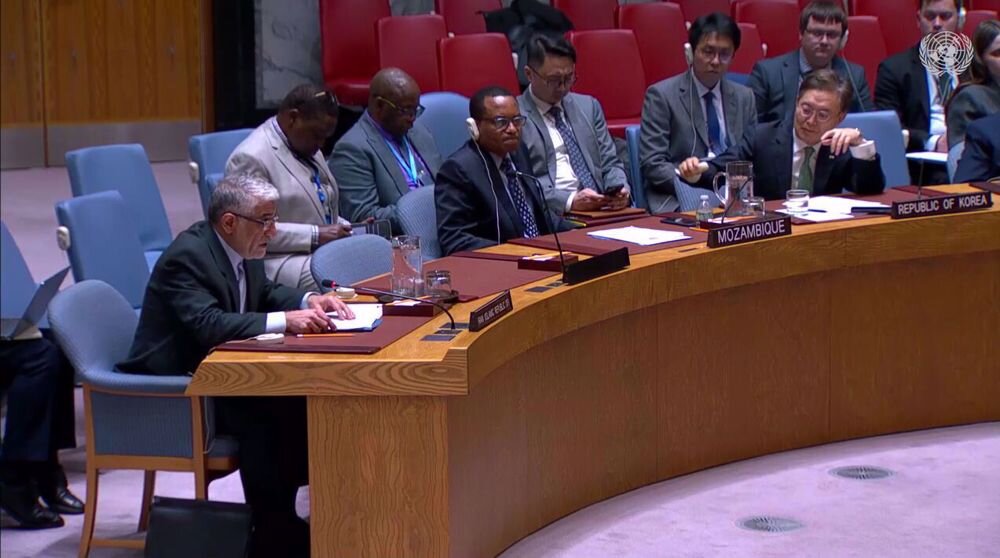Iran UN envoy tells Europe to end snapback threats or face ‘firm response’

TEHRAN – Iran has issued a strong warning to the three European members of the Joint Comprehensive Plan of Action (JCPOA), the E3 (France, Germany, and the UK), against attempting to reinstate sanctions under the deal's "snapback" mechanism.
Iran's UN Ambassador, Amir Saeid Iravani, delivered a forceful address to the UN Security Council on Tuesday, stating unequivocally that any such action would be met with a decisive response.
"Iran categorically rejects any threats of invoking the so-called ‘snapback,’ by E3 – an action that would be both unlawful and counterproductive," Iravani declared. He further emphasized the gravity of the situation, stating, "Let’s make it clear once and for all: the so-called ‘Snapback’ is not a tool in your hand to be abused for threatening Iran. Iran has made it very clear that such a provocative move will be reciprocated by a firm and proportionate response.”
Iravani highlighted that Iran's own scaling back of JCPOA commitments stemmed from the West's failure to uphold its end of the bargain. "Iran's decision to walk back on some of its JCPOA commitments was a response to the West’s bad promises," he explained. He maintained that Iran remains committed to cooperation with the International Atomic Energy Agency (IAEA) within its obligations. He urged a change in approach, saying, "The Iranian diplomat urged the E3 and the US to abandon confrontational approaches and demonstrate a true commitment to diplomacy."
He directly addressed the root cause of the current impasse, blaming the U.S. withdrawal from the deal and the subsequent failure of the E3 to fulfill their commitments. "The root cause of the impasse facing the JCPOA is the unilateral withdrawal of the U.S., and the E3’s failure to honor their commitments under the accord," Iravani asserted. He added, "Iran has consistently acted in good faith to uphold the environment for the revival of the JCPOA, even after the United States’ withdrawal and E3's persistence of violating their commitments."
Iravani also criticized the attempts to link Iran's nuclear program to regional issues, arguing that the real threats to regional stability stem from elsewhere. He stated, "Instead of diverting attention to fabricated threats, the United States, France, and the United Kingdom, as permanent members of the Security Council must allow this Council to live up to its responsibility and address and confront the genuine sources of insecurity and instability in our region: the Israeli regime’s illicit nuclear weapons arsenal, its decades of aggression and occupation, and its ongoing campaign of systematic war crimes, crimes against humanity and acts of genocide against the Palestinian people in Gaza.”
He further condemned Israel’s actions in Syria and Lebanon, declaring, “Further, Israel’s relentless aggression and atrocious crimes against Syria and Lebanon underscore its role as the primary driver of violence and instability in the region.”
The envoy concluded by highlighting Iran's commitment to negotiations but lamented the lack of good faith from the other parties: "Iran engaged in the Vienna talks in good faith, showing utmost flexibility to achieve a balanced and mutually beneficial agreement. Unfortunately, the unrealistic demands of the E3 and the United States, their lack of political will, domestic political considerations, and attempts to tie the negotiations to unrelated issues ultimately failed the efforts to revive the deal. Blaming Iran for the failure to conclude the negotiations is both unjust and factually incorrect.”
Ambassadors of China and Russia echoed Iravani’s sentiments, stating that Washington, as the main culprit in the JCPOA crisis, should refrain from its maximum pressure measures and show its good faith toward Iran. They also called on European signatories to the deal to refrain from blackmailing Tehran through the snapback mechanism.
Leave a Comment